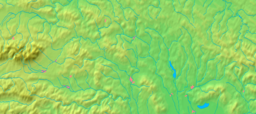Svit
| Svit | |
| Municipality | |
| Country | Slovakia |
|---|---|
| Region | Prešov |
| District | Poprad |
| Tourism region | Tatry |
| Elevation | 763 m (2,503 ft) |
| Coordinates | 49°03′57″N 20°11′14″E / 49.06583°N 20.18722°ECoordinates: 49°03′57″N 20°11′14″E / 49.06583°N 20.18722°E |
| Area | 4.506 km2 (2 sq mi) |
| Population | 7,608 (2010-12-31) |
| Density | 1,688/km2 (4,372/sq mi) |
| Mayor | Zdeno Dolnik |
| Timezone | CET (UTC+1) |
| - summer (DST) | CEST (UTC+2) |
| Postal code | 059 21 |
| Phone prefix | 421-52 |
| Car plate | PP |
| Statistics: MOŠ/MIS | |
| Website: http://www.svit.sk | |
Svit is a small town and municipality in Poprad District in the Prešov Region in northern Slovakia. It lies 8 km (5 mi) west of the city of Poprad, at the foothills of the High Tatras.
Svit is one of the youngest Slovak towns. It was established in 1934 by business industrialist Jan Antonín Baťa of Zlín, Czechoslovakia (now Czech Republic) through his organization Baťa a.s., Zlin in accordance with his policy of setting up villages around the country for his workers. As a boy, Jan Baťa saw the poverty and sickness of his fellow countrymen. He wanted to change this by creating cities full of the most modern factories and filled with the best (and happiest) workers in Europe. The Baťa System under Jan's administration brought prosperity first to Moravia, and later Slovakia and Bohemia. It was Jan's policy for full employment that drove him to create each Baťa town for a different purpose: Shoes, Rubber and Tires, Textiles, Airplanes, Chemicals, Plastics, Media, Stockings, Leather, Machinery.
When the Second World War came, Jan Baťa's policy was to secretly fund the Czechoslovak government-in-exile, to supply the Czech Army with shoes and clothing and to secretly fund the Slovak National Uprising that started at Baťovany (now Partizánske) on August 29, 1944. Jan Baťa represented Czech/Slovak freedom and prosperity.
Svit is short for "Slovenské vizkózové továrne" (in English Slovak Viscose Works). (Also, the word svit means "shine" in Slovak language.) Svit is the smallest town in Slovakia (4.5 km²) with the population of 7,400.
According to the 2001 census, the town had 7,445 inhabitants. 96.44% of inhabitants were Slovaks, 1.11% Romani and 0.79% Czechs. The religious make-up was 62.53% Roman Catholics, 20.67% people with no religious affiliation, 8.62% Lutherans and 4.00% Greek Catholics.
...
Wikipedia





